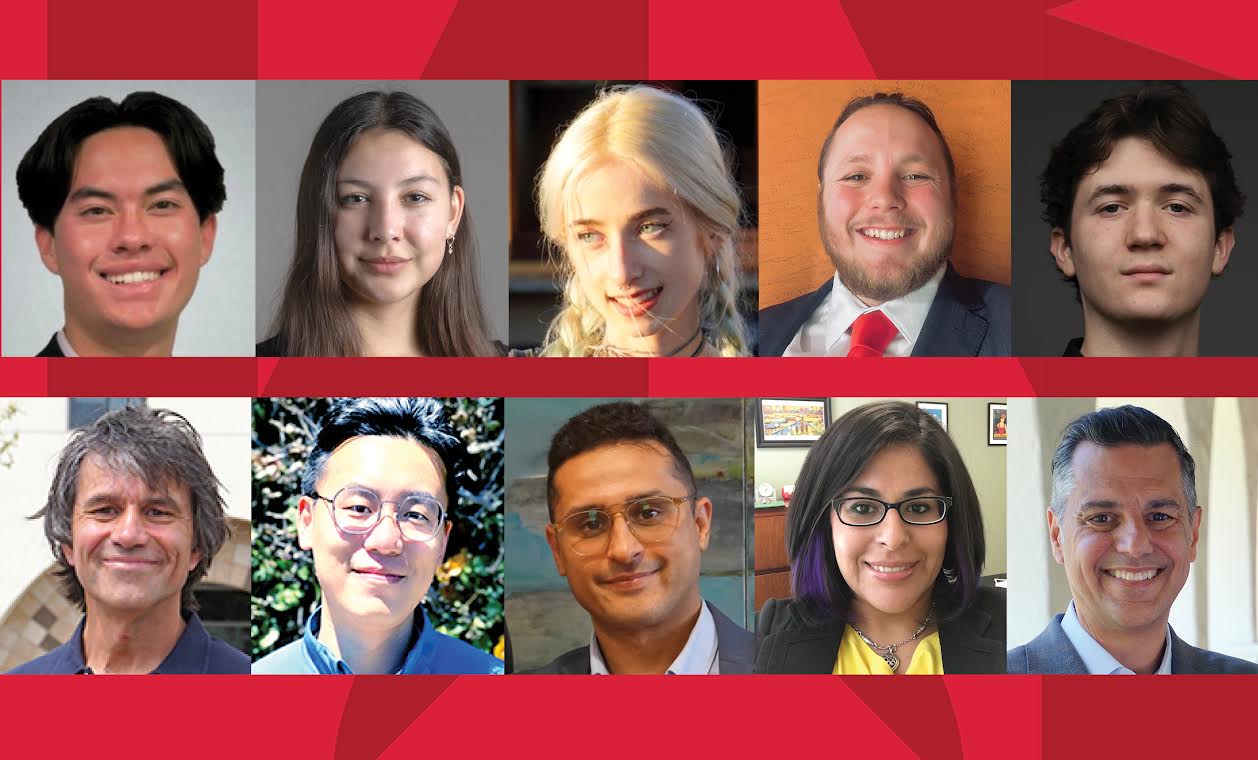Faculty and undergraduates team up to research drones, comics, AI and more
Members of CAL MUSE cohorts share details of their research projects

The College of Arts and Letters Mentoring for Undergraduate Student Excellence program, or CAL MUSE, fosters interdisciplinary collaboration and undergraduate research within the College of Arts and Letters.
Faculty and undergraduate students pair up to design a project of interest to both parties, applying for a grant to fund their work. Student assistants (SAs), or MUSE awardees, spend 80 hours in support of their faculty mentor to conduct, organize, and compile research on the designated subject.
The MUSE program has granted 12 awards since fall 2024. After the mentorship ends, faculty encourage their student assistants to submit their work to the College of Arts and Letters journal of undergraduate research Splice and the annual S3 student research symposium with the ultimate goal of professional development and career readiness.
Here is a look at five of the teams:
Purnell Strom was an undergraduate researcher in the MUSE program during fall 2024. He is set to graduate in 2026 with dual degrees in political science and international security and conflict resolution. Mentored by political science professor Mikhail Alexseev, the project explored how new technology has transformed modern warfare’s surveillance, targeting, and direct strikes. Strom and Alexseev focused on the impact of drones and AI integration on the Russo-Ukrainian conflict.
“This conflict demonstrates a paradigm shift in military operations, where drones are no longer auxiliary tools but central to battlefield dynamics, shaping not only this conflict but the future of modern warfare strategies,” Strom said.
Yang Liang, assistant professor of economics, researched the “Effects of hospital access on take-up of SSI/SSDI benefits, in rural areas” with undergraduate Sagel Provancher as part of the MUSE program’s fall 2024 awardees. Provancher plans to graduate this year with double majors in economics and sociology and a double minor in interdisciplinary studies and sustainability. Their research aims to evaluate how changes in hospital access (hospital closures) influence Social Security Insurance (SSI) and Social Security Disability Insurance (SSDI) participation and to analyze the differential impacts based on rurality, race and ethnicity. Provancher’s responsibilities included conducting a literature review and collecting and analyzing county-level data. Reflecting on his time mentoring Provancher, Liang spoke about MUSE’s benefits on a broader scale:
“I think MUSE is an excellent program for students to get started with hands-on research under the guidance of a faculty member. It effectively leverages the comparative advantages of both parties to make real progress on research projects and provides great benefits to the students. Mentoring Sagel has been a very rewarding experience,” Liang said.
Madeline Kerins is a fourth-year linguistics major working with linguistics and Asian and Middle Eastern languages professor Naseh Nasrollahi Shahri. Kerins has been involved with the MUSE program since fall 2024. She and Shahri have teamed up to complete the project titled “Digital Tools in Second Language Writing.” Their research focuses on conducting a sociolinguistic interview of ESL students to determine their perceptions, usage, and application of ChatGPT.
Kerins said, “ChatGPT remains a highly relevant topic of research as the use of AI continues to become a more casual and integrated part of academic life … the findings of this study will be of students’ metacognitive reflection towards their use of ChatGPT, examining their hesitations, tendencies, and strategies, rather than evaluative of the success of such usage.”
Consuelo Salas, professor of rhetoric and writing studies, will participate in MUSE’s spring program. She will collaborate with undergraduate Tait Arnold on the project “Student’s Perception and Use of Large Language Models in their Writing Process.” Arnold, as a third-year rhetoric and writing studies and political science major, has a shared interest in the research subject. Salas and Arnold are endeavoring to understand how students use large language models such as ChatGPT and other AI software in their writing. Salas eagerly awaits the opportunity to mentor Arnold through their research and learn more about this pertinent topic together.
“While the field of Artificial Intelligence (AI) is not entirely new, its pervasive integration into public and educational spheres has only surged significantly in the past couple years. AI, particularly Large Language Models (LLMs), has experienced a remarkable increase in utilization among students, often without adequate guidance,” Arnold said. “My research aims to delve into the impact of LLMs on higher education pedagogies. Specifically, I intend to explore how LLMs influence students' voices, their interactions with higher education, and the resultant effects on learning outcomes.”
“Tait always brings unique perspectives to our conversations,” Salas said. “I believe that his perspective as a student will be invaluable as we work to create a survey on LLMs for students. Tait is a very dedicated student who is eager to continue to expand on what he knows and dive into things he is unfamiliar with. I look forward to working with him and sharing just a few of the various research methods we use in the field of writing studies.”.
Gregory Daddis, professor of history and recent addition to the Center for Comics Studies, is heading off the upcoming project “Comics and Cold War America.” Daddis will work with undergraduate Andrew Murphy. Murphy is a first-year student studying mechanical engineering. The pair’s research will focus on how comics influenced Cold War America in the 1950s and 1960s, looking specifically at its reinforcement of militarization. Daddis looks forward to beginning this work in the spring:
“I'm excited because we'll have a chance to showcase what the SDSU Center for Comics Studies can do for student development and because of the opportunity to work one-on-one with a stellar undergraduate student who is interested in examining how comics served as a powerful cultural force in representing the United States in what many believed was an existential battle between good and evil,” Daddis said.



